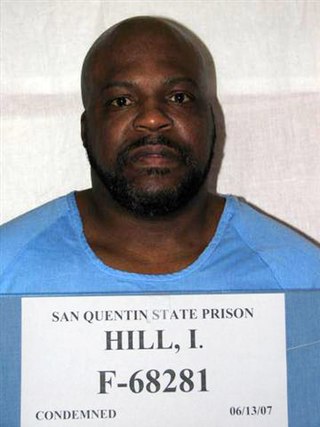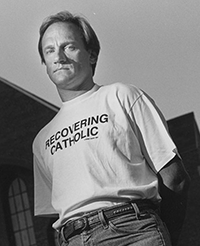Related Research Articles
Life imprisonment is any sentence of imprisonment for a crime under which the convicted criminal is to remain in prison for the rest of their natural life. Crimes that warrant life imprisonment are extremely serious and usually violent. Examples of these crimes are murder, torture, terrorism, child abuse resulting in death, rape, espionage, treason, illegal drug trade, human trafficking, severe fraud and financial crimes, aggravated property damage, arson, hate crime, kidnapping, burglary, robbery, theft, piracy, aircraft hijacking, and genocide.
Dorothy Rabinowitz is a Pulitzer Prize winning American journalist and commentator.
Paul Richard Shanley was an American Roman Catholic priest who became the center of a massive sexual abuse scandal in the Archdiocese of Boston in Massachusetts. Beginning in 1967, the archdiocese covered up numerous allegations of child sexual assault against Shanley and facilitated his transfers to other states.

James Porter was a Roman Catholic ex-priest who was convicted of molesting 28 children; he admitted to sexually abusing at least 100 children of both sexes over a period of 30 years, starting in the 1960s.
Wee Care Nursery School, located in Maplewood, New Jersey, was the subject of a day care child abuse case that was tried during the 1980s. Although Margaret Kelly Michaels was prosecuted and convicted, the decision was reversed after she spent five years in prison. An appellate court ruled that several features of the original trial had produced an unjust ruling and the conviction was reversed. The case was studied by several psychologists who were concerned about the interrogation methods used and the quality of the children's testimony in the case. This resulted in research concerning the topic of children's memory and suggestibility, resulting in new recommendations for performing interviews with child victims and witnesses.
The Fells Acres day care sexual abuse trial took place in the Commonwealth of Massachusetts following charges initially lodged in the mid-1980s against family members who operated a day care center, Fells Acres Day School, in Malden, Massachusetts. The facility had been opened in 1966 by Violet Amirault (1923–1997). She and her two children—son Gerald Amirault and daughter Cheryl Amirault LeFave —were tried for sexually abusing children at their facility. Gerald was tried in 1986 while his sister and mother were tried in 1987. All three were convicted and sentenced to prison. The Amiraults deny the charges, which supporters regard as a conspicuous example of day-care sex-abuse hysteria.
Day-care sex-abuse hysteria was a moral panic that occurred primarily during the 1980s and early 1990s, and featured charges against day-care providers accused of committing several forms of child abuse, including Satanic ritual abuse. The collective cases are often considered a part of the Satanic panic. A 1982 case in Kern County, California, United States, first publicized the issue of day-care sexual abuse, and the issue figured prominently in news coverage for almost a decade. The Kern County case was followed by cases elsewhere in the United States, as well as Canada, New Zealand, Brazil, and various European countries.

Martha Mary Coakley is an American lobbyist, lawyer, and former politician who served as Attorney General of Massachusetts from 2007 to 2015. Prior to serving as Attorney General, she was District Attorney of Middlesex County from 1999 to 2007.

Central California Women's Facility (CCWF) is a female-only California Department of Corrections and Rehabilitation state prison located in Chowchilla, California. It is across the road from Valley State Prison. CCWF is the second largest female correctional facility in the United States, and houses the only State of California death row for women.
This is a list of notable overturned convictions in the United States.
In the United States, life imprisonment is the most severe punishment provided by law in states with no valid capital punishment statute, and second-most in those with a valid statute. According to a 2013 study, 1 of every 2 000 inhabitants of the U.S. were imprisoned for life as of 2012.
The Archdiocese of Boston sex abuse scandal was part of a series of Catholic Church sexual abuse cases in the United States that revealed widespread crimes in the American Catholic Church. In early 2002, TheBoston Globe published results of an investigation that led to the criminal prosecutions of five Roman Catholic priests and thrust the sexual abuse of minors by Catholic clergy into the national spotlight. Another accused priest who was involved in the Spotlight scandal also pleaded guilty. The Globe's coverage encouraged other victims to come forward with allegations of abuse, resulting in numerous lawsuits and 249 criminal cases.
Catholic sexual abuse cases in Australia, like Catholic Church sexual abuse cases elsewhere, have involved convictions, trials and ongoing investigations into allegations of sex crimes committed by Catholic priests, members of religious orders and other personnel which have come to light in recent decades, along with the growing awareness of sexual abuse within other religious and secular institutions.
The Country Walk case is a 1985 child sex abuse case which occurred in Florida and was described as a "Multi-Victim, Multi-Offender" case. Francisco Fuster-Escalona, known as Frank Fuster, was convicted on multiple charges and sentenced to a minimum of 165 years behind bars, while his wife Illiana served three years. Appeals courts at the state and federal level have consistently ruled against Frank Fuster.
Child sexual abuse is a matter of concern in Australia, and is the subject of investigation and prosecution under the law, and of academic study into the prevalence, causes and social implications.

Ivan Jerome Hill, also known by his nickname The 60 Freeway Killer, is an American serial killer who raped and murdered at least eight women in Los Angeles between 1986 and 1994. Hill dumped his victims' corpses along the East-West Highway, known as "California State Route 60", contributing to his nickname. Hill was captured based on DNA profiling nearly a decade after his last murder and was sentenced to death in 2007.
The Fall River murders were a series of three homicides that took place in Fall River, Massachusetts, from October 1979 to February 1980 allegedly by a satanic cult. It was the onset of a period in American history known as the Satanic panic.

Phillip James Saviano was an American advocate for survivors of Catholic church sexual abuse. As a youth, Saviano was abused by a priest in the early 1960s. Thirty years later, after reading about the priest abusing other youths in another state, Saviano went public, becoming one of the earliest survivors of church sexual abuse to do so. He brought a lawsuit against his local diocese, uncovering evidence of additional abuse. Eventually, his investigation led to The Boston Globe publishing a Pulitzer Prize-winning series of articles exposing the Catholic Archdiocese of Boston sex abuse scandal, which was dramatized in the 2015 Academy Award-winning film Spotlight.

George Albert Sweetser was an American lawyer and horticulturist. He was a noted corporate and trial attorney until he pleaded guilty to theft from clients. After his release from prison, Sweetser became a landscape gardener and was considered an expert on roses.
References
- ↑ "Level 3 Sex Offender - Detail Flyer | Gerald A Amirault". MA.us. Massachusetts Executive Office of Public Safety and Security. Archived from the original on August 27, 2011 – via Wayback Machine.
- ↑ "Day care center is shut down". Corpus Christi Times . AP. September 13, 1984. p. 20A. Retrieved December 13, 2022– via newspapers.com.
- ↑ "Late News Line". The Pensacola News . AP. September 13, 1984. p. 2. Retrieved December 13, 2022– via newspapers.com.
- ↑ "Day care center still closed after rape charge". Argus Leader . Sioux Falls, South Dakota. September 14, 1984. p. 3. Retrieved December 13, 2022– via newspapers.com.
- 1 2 Leung, Rebecca (April 27, 2004). "A Family Accused: Employees At Day Care Center Accused Of Abusing Children". CBS. Archived from the original on August 28, 2004. Retrieved January 18, 2010.
- ↑ Rabinowitz, D (1995-03-14). "A Darkness in Massachusetts--II". The Wall Street Journal. Archived from the original on 2003-08-26. Retrieved 2007-10-31.
- 1 2 3 4 5 6 Rabinowitz, Dorothy (January 14, 2010). "Martha Coakley's Convictions". Wall Street Journal. Retrieved January 18, 2010.
- ↑ "The Pulitzer Prizes | Citation". Pulitzer.org. Retrieved 2009-08-05.
- ↑ "The Pulitzer Prizes | A Hearing in Boston". Pulitzer.org. 2000-10-31. Archived from the original on 2005-04-16.
- ↑ "Day Care Workers Get Retrial, As Accusers Did Not Face Them". The New York Times . 1995-08-30. Retrieved 2007-10-31.
- ↑ Ranalli, Ralph (May 1, 2004). "Amirault released from prison, bringing Fells Acres case to end". The Boston Globe . p. B6. Retrieved December 22, 2022– via newspapers.com.
- ↑ Massachusetts Lawyers Weekly, Editorial: Travesty of Justice, Sept. 13, 1999.
- ↑ Ellement, John; Doherty, William F. (September 13, 1997). "Violet Amirault, center of child rape case, dies at 74". The Boston Globe . p. 1. Retrieved December 22, 2022– via newspapers.com.
- ↑ Rakowsky, Judy (October 22, 1999). "LeFave granted freedom". The Boston Globe . p. 1. Retrieved December 22, 2022– via newspapers.com.
- ↑ "Gerald Amirault's Freedom: Today he leaves prison, after serving 18 years on phony charges". Wall Street Journal. April 30, 2004. Retrieved September 16, 2008.
- ↑ Mei Ling Rein (2005). Child abuse: betraying a trust . Detroit: Thomson/Gale. p. 104. ISBN 0-7876-9068-6.
- ↑ Pollitt, Katha (February 28, 2002). "Justice, Not So Swift: Subject to Debate". The Nation. Retrieved January 18, 2010.
- ↑ Rabinowitz, Dorothy (May 28, 2004). "Homecoming: Gerald Amirault enjoys his first days of freedom in 18 years". Wall Street Journal. Archived from the original on February 17, 2005. Retrieved January 17, 2010.
- ↑ Lawrence, J.M. (May 1, 2005). "'Tooky' Amirault walks free after 18 years". Boston Herald. Retrieved 2009-12-28.[ dead link ]
- ↑ Lavoie, Denise (May 1, 2004). "Amirault release from prison after 18 years". North Adams Transcript . North Adams, Massachusetts. AP. p. 10. Retrieved December 22, 2022– via newspapers.com.
- ↑ Stout, Matt (2022-11-18). "Baker recommends pardons for siblings convicted in Fells Acres day-care abuse case". BostonGlobe.com. Retrieved 2022-11-19.
- ↑ LeBlanc, Steve (December 14, 2022). "Massachusetts governor abandons pardons in sex abuse case". apnews.com. Retrieved December 14, 2022.
- ↑ Scott, Ivy; Stout, Matt; Alanez, Tonya (December 14, 2022). "Baker withdraws controversial pardon requests in Fells Acres child abuse case" . The Boston Globe . Retrieved December 14, 2022.